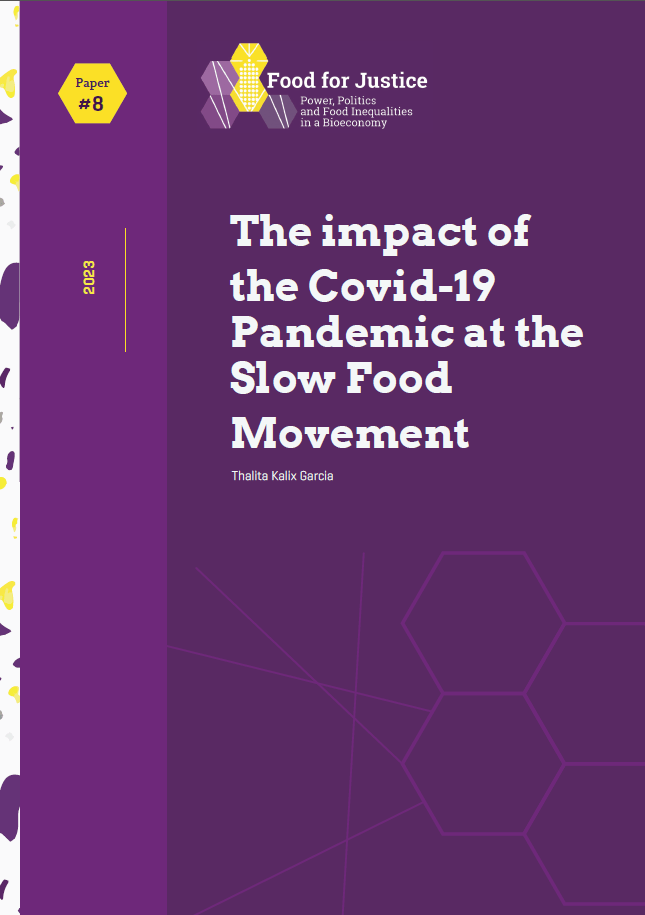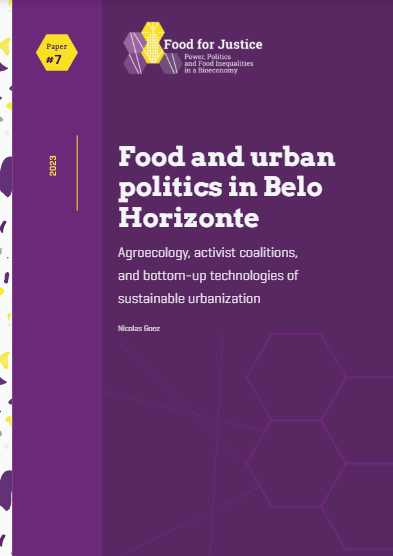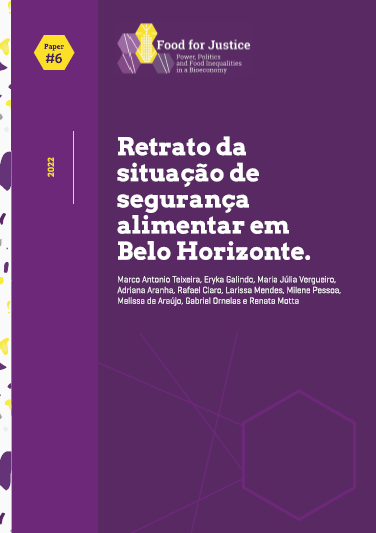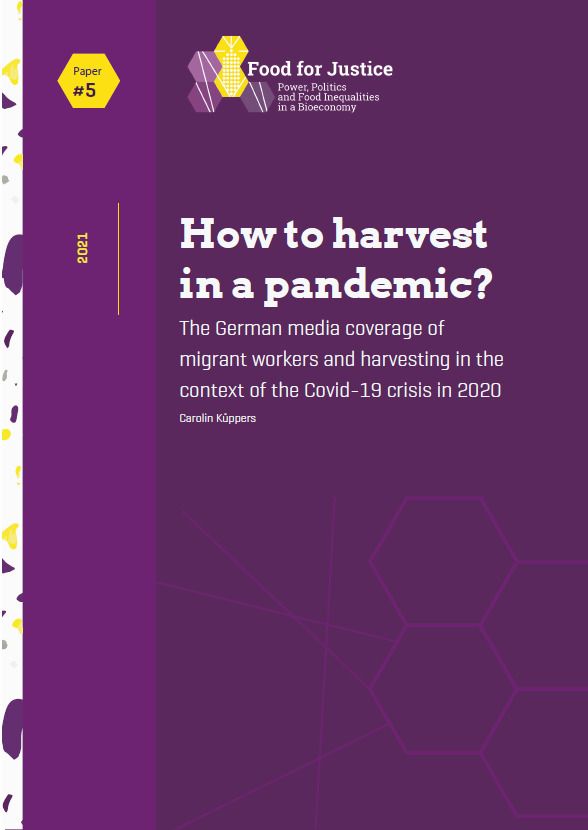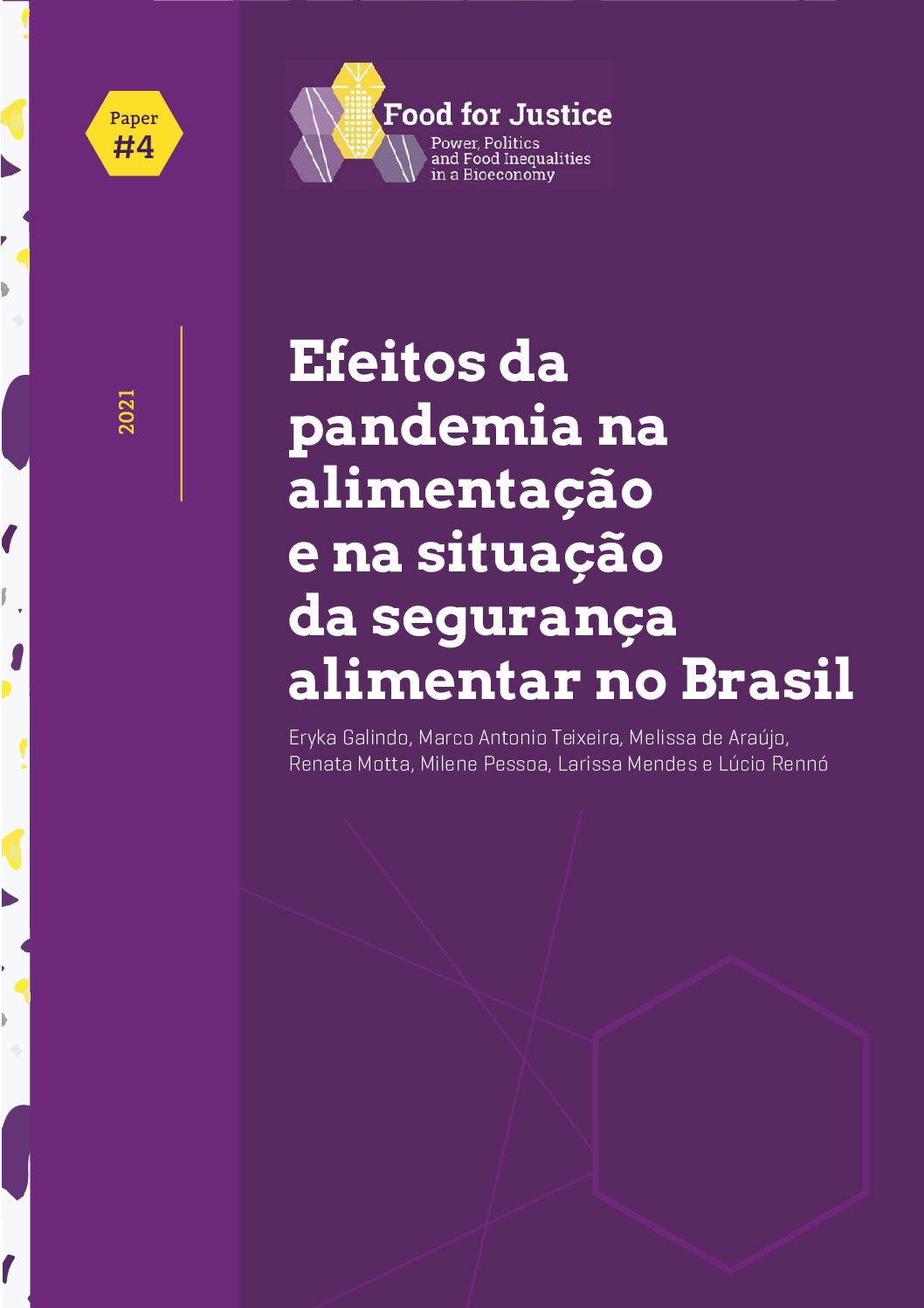Working Paper 9 • 2024
Políticas de Segurança Alimentar e Nutricional nos Municípios Brasileiros
Abstrato
Esta publicação registra ideias centrais que emergiram em torno da atividade autogestionada “Política de Segurança alimentar e nutricional no âmbito municipal: contexto e oportunidades”, realizada de forma virtual no V Encontro Nacional de Pesquisa em Soberania e Segurança Alimentar e Nutricional (V ENPSSAN, 2022). Garantir o Direito Humano à Alimentação Adequada e o alcance das políticas públicas de Segurança Alimentar e Nutricional (SAN) passam, necessariamente, por reconhecer o papel central dos municípios na execução de ações e construção de diálogos locais, de forma integrada com os demais poderes públicos e áreas governamentais, como propõe o Sistema Nacional de SAN. No debate emergiram reflexões sobre monitoramento da segurança/insegurança alimentar populacional, definições e conceitos associados às políticas públicas de SAN, relatos de experiências municipais, bem como oportunidades para a retomada e fortalecimento das políticas de SAN nos municípios. Foram identificados oito potenciais enfoques para contribuir com o campo de pesquisas sobre políticas públicas de SAN no contexto municipal: governança participativa; diversidade territorial e a relação rural-urbano; institucionalidades; atuação da sociedade civil; intersetorialidade; escalas e distintas espacialidades; interface com a agenda socioecológica; e capacidades estatais. Por fim, identificou-se também temas e alguns desafios para a efetividade das políticas de SAN municipais. Este documento traz contribuições coletivas às distintas janelas de oportunidades que atualmente se encontram em frente aos diversos atores sociais envolvidos nas políticas de SAN municipais. Neste sentido, destacamos a retomada da agenda pública guiada e fortalecida pelo Governo Federal (a partir de 2023), a retomada do Consea nacional e a ocorrência, em 2024, de eleições municipais.
Working Paper 8 • 2023
The impact of the Covid-19 Pandemic at the Slow Food Movement
Abstrato
O surto do coronavírus foi declarado uma pandemia global em março de 2020, fazendo com que muitos países entrassem em lockdown para tentar contê-lo e evitar ou diminuir a sobrecarga dos sistemas nacionais de saúde. Como o trabalho e os estudos passaram a ser on-line e o distanciamento social tornou-se uma regra de segurança, os movimentos sociais também tiveram de se adaptar. Além disso, os movimentos de alimentos ganharam mais relevância, pois uma das primeiras preocupações foi manter a produção e a distribuição de alimentos em todo o mundo, apesar das paralisações. Este artigo tem como objetivo analisar os impactos da pandemia de Covid-19 no movimento Slow Food, como ela mudou a organização, a agenda e as ações do movimento. Ele se baseia em pesquisa empírica em dois países: Brasil e Alemanha, e analisa três momentos da pandemia, desde seu primeiro impacto em 2020 até as adaptações e continuidades em 2021 e 2022. Este trabalho se baseia em uma etnografia presencial e virtual e faz parte de uma investigação mais ampla sobre o movimento em ambos os países.
Working Paper 7 • 2023
Food and urban politics in Belo Horizonte: agroecology, activist coalitions, and bottom-up technologies of sustainable urbanization
Abstrato
O objetivo deste documento de trabalho é contribuir para o debate emergente entre os estudos urbanos e alimentares, trazendo à tona a dimensão sociopolítica do sistema alimentar e seu contexto urbano. Orientado pelas questões gerais de pesquisa do projeto “Food for Justice: Poder, Política e Desigualdades Alimentares em uma Bioeconomia “1, esta pesquisa está inserida em um estudo de caso sobre política alimentar na cidade de Belo Horizonte. Ela trata das inovações sociais dos movimentos agroecológicos e de moradia da cidade e dos moradores da Izidora, habitantes do chamado “assentamento informal”, cujo engajamento na luta por moradia e pelo direito à cidade produziu conquistas notáveis na construção de coalizões ativistas e na ressignificação de espaços urbanos marginais. Com base no trabalho de campo etnográfico digital que realizei entre janeiro e dezembro de 2020, analiso o contexto, o uso e o alcance dessas inovações sociais como um instrumento para transformar o desenvolvimento urbano nas periferias de Belo Horizonte.
Working Paper 6 • 2022
Retrato da situação de segurança alimentar e nutricional em Belo Horizonte
Abstrato
Esta publicação analisa a situação de insegurança alimentar na cidade de Belo Horizonte, capital do estado de Minas Gerais e município reconhecido nacionalmente
por um histórico de execução de políticas públicas de segurança alimentar. Os dados analisados foram coletados por meio de pesquisa de opinião pública representativa da população belo-horizontina, realizada em pontos de fluxo distribuídos em
113 bairros entre os dias 7 e 27 de abril de 2022. Esta pesquisa foi coordenada pelo
Grupo de Pesquisa Alimento para Justiça: Poder, Política e Desigualdades Alimentares na Bioeconomia, da Freie Universität Berlin (Alemanha), em parceria com pesquisadoras/es do Grupo de Estudos, Pesquisas e Práticas em Ambiente Alimentar
e Saúde (GEPPAAS) da Universidade Federal de Minas Gerais (UFMG), do Fórum de
Pesquisadores em Soberania e Segurança Alimentar de Belo Horizonte, da Subsecretaria de Segurança Alimentar e Nutricional da Prefeitura de Belo Horizonte,
do Instituto Fome Zero (IFZ) e Centro de Estudos das Metrópoles da Universidade
de São Paulo (CEM/USP). Os percentuais de insegurança alimentar verificados no
município de Belo Horizonte são semelhantes aos registrados por pesquisas recentes realizadas em escala nacional, sendo a insegurança alimentar leve presente
em 30,1% dos domicílios, a moderada em 12,4% dos casos e a grave em 13,2%.
Verificou-se que domicílios chefiados por única pessoa do sexo feminino (63,3%)
ou de raça ou cor parda (57,3%) e preta (68,4%), ou ainda, quando tinham em sua
composição crianças de até 4 anos (66,9%) ou crianças e adolescentes de 5 a 17
anos (64,7%) apresentavam maior frequência de insegurança alimentar, somados
os seu três gradientes. A frequência de insegurança alimentar é também maior
nos domicílios cuja renda per capita é equivalente a até ¼ do salário-mínimo (R$
303,00, trezentos e três reais) (86,9%). A insegurança alimentar se reproduz a partir do entrelaçamento de desigualdades, o que exige um conjunto amplo de ações
que venham a superar tais assimetrias, o que inclui uma ação estatal que articule
diferentes níveis e esferas de poder, com participação popular, e de abordagem intersetorial, que integre e assegure um conjunto de direitos e políticas à população
mais vulnerável.
Working Paper 5 • 2021
How to harvest in a pandemic? The German media coverage of migrant workers and harvesting in the context of the Covid-19 crisis in 2020
Abstrato
The COVID-19 pandemic has widely been discussed as a crisis that impacts daily life on a global scale, including food security, global supply chains, consumer
behaviour and nutrition. In this crisis, providing food became an even more essential service, agricultural work became an essential activity, and with this, farm
workers became so-called essential workers. In Germany, this topic was broadly
taken up by local and national newspapers. Due to immense media interest during
the first lockdown, the working conditions in the food sector and especially the
marginalized status of farmworkers were rendered visible to a broader public. This
paper analyses the discourses and how food production in times of the pandemic
affects pre-existing workers’ inequalities and lack of workers’ rights, revealing migrant workers as one of the most vulnerable groups in the German food system. It
concludes by demonstrating that the mechanisms of Covid-19, which have been
exacerbating existing inequalities in the food sector during the pandemic, are part
of a structural socio-economic and socio-political crisis that must be regarded in
the context of global capitalism and intersectional inequalities.
Working Paper 4 • 2022
Efeitos da pandemia na alimentação e na situação da segurança alimentar no Brasil
Abstrato
Esta publicação analisa os efeitos da pandemia da Covid-19 sobre a alimentação
da população brasileira, com relação à situação de segurança alimentar e ao consumo de alimentos. Os dados analisados foram coletados por meio de pesquisa de
opinião pública realizada entre os meses de novembro e dezembro de 2020, coleta
telefônica, junto à amostra representativa da população brasileira. Esta pesquisa foi
coordenada pelo Grupo de Pesquisa Alimento para Justiça: Poder, Política e Desigualdades Alimentares na Bioeconomia, da Freie Universität Berlin (Alemanha), em
parceria com pesquisadoras/es da Universidade Federal de Minas Gerais (UFMG) e
Universidade de Brasília (UnB). Os resultados demonstram que 59% dos domicílios
entrevistados estavam em situação de insegurança alimentar durante a pandemia
e parte significativa deles diminuiu o consumo de alimentos importantes para a
dieta regular da população – 44% reduziram o consumo de carnes e 41% o consumo de frutas. Assim, os dados coletados corroboram informações anteriores da
Pesquisa Nacional por Amostra de Domicílio que indicavam o aumento da insegurança alimentar no Brasil nos anos de 2017/2018 em relação aos padrões anteriores, de 2013. Conclui-se que as instabilidades socioeconômicas geradas pelas
crises política e econômica vividas nos últimos anos no país agravaram-se com a
pandemia da Covid-19, acentuando as desigualdades alimentares entre uma parcela da população brasileira, sobretudo, quanto ao acesso a alimentos saudáveis de
forma regular e em quantidade e qualidade suficientes.






